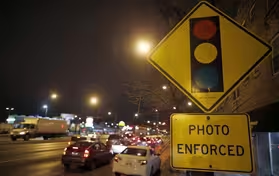
Study provides new insights into homelessness in California
Clip: 7/8/2023 | 6m 21sVideo has Closed Captions
Who’s most likely to become unhoused in California? New study provides insights
Across the country, many Americans are staying indoors with air conditioning on to avoid the summer’s heat and humidity. But that’s not an option for thousands of Californians who are unsheltered and living outside. Dr. Margot Kushel, head of UCSF’s Benioff Homelessness and Housing Initiative, joins Ali Rogin to discuss a new study that offers insights into this population.
Problems playing video? | Closed Captioning Feedback
Problems playing video? | Closed Captioning Feedback
Major corporate funding for the PBS News Hour is provided by BDO, BNSF, Consumer Cellular, American Cruise Lines, and Raymond James. Funding for the PBS NewsHour Weekend is provided by...

Study provides new insights into homelessness in California
Clip: 7/8/2023 | 6m 21sVideo has Closed Captions
Across the country, many Americans are staying indoors with air conditioning on to avoid the summer’s heat and humidity. But that’s not an option for thousands of Californians who are unsheltered and living outside. Dr. Margot Kushel, head of UCSF’s Benioff Homelessness and Housing Initiative, joins Ali Rogin to discuss a new study that offers insights into this population.
Problems playing video? | Closed Captioning Feedback
How to Watch PBS News Hour
PBS News Hour is available to stream on pbs.org and the free PBS App, available on iPhone, Apple TV, Android TV, Android smartphones, Amazon Fire TV, Amazon Fire Tablet, Roku, Samsung Smart TV, and Vizio.
Providing Support for PBS.org
Learn Moreabout PBS online sponsorshipJOHN YANG: Across the country this weekend, many Americans are sweltering in the heat and humidity.
A good time to be indoors with the air conditioning on.
But for thousands of Californians, that's not an option.
They're unsheltered and living outside.
As Ali Rogin reports, a new study from the University of California, San Francisco, offers new insights into this population.
ALI ROGIN: 30 percent of Americans without a home are in California.
Over 3,000 were surveyed as part of the largest representative study of homelessness in the United States since the 1990s.
Among the findings nearly half of all unhoused adults in California are older than 50.
Two-thirds reported mental health symptoms, and a majority said that the cost of housing was the main barrier to finding a home.
People of color are disproportionately affected.
6 percent of California residents are black, but they make up 26 percent of the unhoused population.
1.3 percent of California identify as Native American, compared to 12 percent of the unhoused population.
Dr. Margot Kushel is the principal investigator of the study.
She heads the Benioff Homelessness and Housing Initiative at UCSF.
Dr. Kushel, thank you so much for joining us.
You've been researching homelessness for quite a long time.
What in the findings surprised you?
DR. MARGOT KUSHEL, Benioff Homelessness and Housing Initiative: I think a few things that are worth pointing out.
First, nine in 10 people in the study lost their stable housing in California.
There's a lot of mythology around people coming to California because of the warm weather or whatnot.
We didn't find that at all.
And I think the next thing that really stuck out was how much homelessness was being driven by economic factors.
The median household income of our participants in the months before becoming homeless was only $960 a month.
For context, in California, the median cost of a one bedroom apartment is $1,700 a month.
When we asked what was happening in people's lives before they became homeless, they often had an income shock.
They had their hours cut, someone in the household lost their job, and then they became homeless because they just couldn't pay the rent.
Once they became homeless, everything else fell apart.
ALI ROGIN: I want to ask you also about the racial disparity that we noticed that the homelessness numbers seem to be particularly high among black and Native American communities.
How do you explain those disparities?
MARGOT KUSHEL: These are communities that have been disparately impacted by structural racism throughout the generations.
They are communities that were really shut out of building wealth through home buying.
They have not only faced discrimination in their daily activities, but have huge deficits in household wealth.
Much of it because of the ways that they've been shut out of housing markets, which are the main way that Americans built wealth.
I think you add to that the other forms of oppression, discrimination in our criminal justice system, discrimination in employment system, and all the other forms that racism has leads to this hugely disparate impact.
ALI ROGIN: The study also noted that more than half of unhoused people are over the age of 50.
Why does there seem to be that commonality?
MARGOT KUSHEL: This is really, I think, the story of homelessness in the last few decades, the proportion of people over 50 has skyrocketed.
We found that nearly half, 41 percent of those over 50 had never been homeless before the age of 50.
These are seniors who worked physically demanding difficult, low paid jobs their whole life.
As the cost of housing skyrocketed, their incomes didn't keep up and they simply became displaced into homelessness.
ALI ROGIN: You spoke to many people who are currently experiencing homelessness.
What are their living conditions like?
MARGOT KUSHEL: You know we found that about three quarters were primarily unsheltered, either living in their cars or living outside.
One thing that really stood out to us was the amount of violence.
Just for context, 10 percent of everyone experiencing homelessness reported that they had been sexually assaulted during this episode.
Well over a third had been physically assaulted.
Fewer than half had anyone from any agency or other governmental or nonprofit body try to help them get back into housing.
Since they became homeless, people's health declined.
Their well-being declined, their sense of safety decline.
They became more and more disconnected from work, from labor.
Someone said to us, being homeless, it's a full time job.
What was really striking to us, though, was that basically everyone we encountered wanted desperately to be housed again.
ALI ROGIN: And what are some of your recommendations for achieving that goal?
MARGOT KUSHEL: All routes to ending this crisis really run through housing.
But there isn't going to be a way out of this crisis unless we can address the brutal and dramatic shortage of affordable housing.
So our first recommendations were really about increasing that supply, using things like rental vouchers from the federal government, more support for creating and preserving affordable housing.
A lot of people said that small amounts of money would have stopped their downward slide into homelessness.
We really need to increase access to behavioral health treatment, both to keep people safe when they're homeless, but really importantly to support them when they get housed again.
We need to help people's incomes rise.
Almost half were looking for work.
We need to help them get back into the labor market.
And we really need to take a racial equity approach to everything that we do.
The top line story has to be these are older people of color who have been displaced from housing that is too expensive for them, and we really need to rectify that.
ALI ROGIN: Really fascinating study.
The lead investigator of it, Dr. Margot Kushel with UCSF.
Thank you so much for joining us.
MARGOT KUSHEL: Thank you for having me.
The potential effect of an ACA legal fight on HIV prevention
Video has Closed Captions
Clip: 7/8/2023 | 5m 56s | The potential effect of an Affordable Care Act legal fight on HIV prevention (5m 56s)
Why Black and brown drivers bear the brunt of speed cameras
Video has Closed Captions
Clip: 7/8/2023 | 7m 58s | Why automated speed cameras disproportionately affect Black and brown drivers (7m 58s)
Providing Support for PBS.org
Learn Moreabout PBS online sponsorship
- News and Public Affairs

FRONTLINE is investigative journalism that questions, explains and changes our world.

- News and Public Affairs

Amanpour and Company features conversations with leaders and decision makers.












Support for PBS provided by:
Major corporate funding for the PBS News Hour is provided by BDO, BNSF, Consumer Cellular, American Cruise Lines, and Raymond James. Funding for the PBS NewsHour Weekend is provided by...

